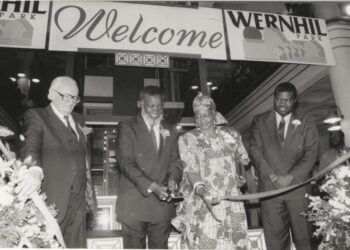
By Martha Murorua
As Namibia establishes itself in the global sports tourism arena, few events shine as brightly as the Nedbank Desert Dash.
This extraordinary race, the longest single-stage mountain bike event in the world, captures the thrill of the Dakar Rally—but on two wheels.
Participants embark on an exhilarating 401-kilometre journey through the breathtaking landscapes of the Khomas Hochland and the Namib Desert, all within a demanding 24-hour timeframe.
Red Bull aptly describes the Nedbank Desert Dash as a ‘race of extremes,’ where participants experience both the majestic dunes of the Namib Desert and the crashing waves of the Atlantic Ocean.
What began two decades ago as a modest event with just 44 participants has evolved into a global spectacle. This year’s event is set to attract over 900 cyclists from around the world.
In recent years, the event has drawn international cyclists from a diverse range of countries, including the Netherlands, South Africa, Spain, the United States, Germany, Canada, Zimbabwe, the United Kingdom, Australia, Italy, Switzerland, and Austria.
Martha Murorua, Managing Director of Nedbank Namibia, emphasises that ‘The Nedbank Desert Dash symbolises something far greater than just a race – it’s an opportunity to harness the economic potential of sports tourism in our country.’
According to the World Tourism Organisation, sports tourism is one of the fastest-growing sectors globally, thriving on the rising interest in sports activities while offering authentic local experiences. Currently, sports tourism accounts for around 10% of global tourism expenditure and is projected to grow at an impressive rate of 17.5% between 2023 and 2030.
These global trends align with the upward trajectory of Namibia’s local tourism industry, says Murorua. At present, tourism is the fastest-growing economic sector in Namibia, employing over 100,000 individuals, particularly in rural areas.
‘This sector plays a vital role in alleviating rural poverty and considering the overall growth of our nation’s tourism landscape, the potential for expansion in sports tourism specifically is immense,’ she adds.
‘We’ve observed the tremendous success of our regional neighbour, South Africa, in growing its sports tourism industry. In 2022, their sports tourism accounted for between 2% and 5% of the global market, attracting over 50,000 visitors each year and injecting approximately $3.6 billion into the local economy.’
For example, the Comrades Marathon, one of the world’s premier ultra-marathon events, contributed around N$600 million to the economy in Kwa-Zulu Natal, while Cape Town’s Two Oceans Marathon provided an estimated N$627 million boost to the region’s tourism and hospitality sectors.
‘Additionally, remarkable examples of this phenomenon have been witnessed further afield,’ Murorua adds.
The US city of Boston, for example, experienced a $200 million economic boost when 30,000 runners and countless spectators from 130 countries gathered for the 128th Boston Marathon in April.
‘These sporting events have transformed their host cities into global tourist destinations, leading to increased international participation and significant investments in local economies. Namibia stands poised to experience similar growth, leveraging events like the Nedbank Desert Dash to become a vibrant hub for sports tourism,’ Murorua says.
Beyond enhancing Namibia’s reputation as a premier sports tourism destination, the Nedbank Desert Dash also provides a substantial boost to small and medium enterprises (SMEs), injecting an estimated N$25 million into local businesses.
‘The impact of the influx of race participants, spectators, and support staff on small businesses is remarkable,’ says Murorua. ‘The Nedbank Desert Dash has become a vital economic driver for Namibia, particularly in Windhoek and Swakopmund. Demand for accommodation, dining, and other services surges, providing a much-needed lift to local enterprises. Hotels, guesthouses, and lodges often reach full occupancy, frequently booked months in advance.’
Such events not only stimulate the economy at both micro and macro levels but also encourage infrastructure investment from both the private and public sectors, she adds.
‘With a renewed emphasis on investment, led by the Namibia Investment Promotion and Development Board (NIPDB) and the Ministry of Trade and Industrialisation, the Nedbank Desert Dash stands out as a beacon for potential investors. These organisations are dedicated to enhancing Namibia’s global standing, and events like these are vital to achieving that vision,’ says Murorua.
Demonstrating his dedication to the initiatives of the NIPDB and the Ministry, our president, H.E. Dr. Nangolo Mbumba, recently co-chaired the Pivotal Summit of the Future during the 79th High-Level Session of the United Nations General Assembly in New York. During this visit, he oversaw the adoption of the Pact of the Future, which calls on world leaders to address pressing global challenges such as climate change, development financing, rising inequality, conflict, and food security.
‘While promoting our nation on the world stage, His Excellency’s efforts align seamlessly with Namibia’s commitment to prioritising climate action and sustainability,’ Murorua says.
‘The Nedbank Desert Dash takes place in an ecologically sensitive area, underscoring the importance of environmental sustainability. The event not only raises awareness about environmental issues but also promotes conservation initiatives, with participants and organisers actively advocating for the preservation of the Namib’s pristine beauty while minimising the ecological footprint of the race.’
In addition to fostering environmental stewardship, the Nedbank Desert Dash serves as a powerful platform for social good.
‘Many riders dedicate their efforts to raising awareness and funds for critical causes. We’ve seen participants push their limits to highlight urgent issues such as wildlife conservation, educational initiatives in underprivileged communities, and healthcare projects that deliver essential medical services to remote areas.’
Nedbank’s longstanding commitment to the Nedbank Desert Dash embodies the green bank’s ethos of being ‘money experts who do good’.
This dedication is reflected in Nedbank Namibia’s active involvement with the race, which yields numerous positive outcomes for the nation—from supporting small businesses in coastal towns to creating investment opportunities and promoting the conservation of our fragile ecosystems.
‘With the support of both public and private sectors, we aim to significantly accelerate this growth,’ Murorua says. ‘In turn, positioning Namibia as a premier destination in the sports tourism arena.’
Martha Murorua is Nedbank Namibia Managing Director.











